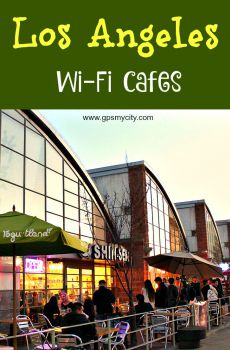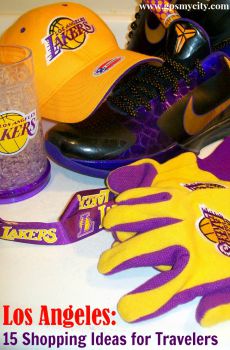Downtown Architecture Walking Tour (Self Guided), Los Angeles
For different people, Los Angeles means different things. One such is undoubtedly architecture. Being one of the centers of the Art Deco movement, LA features a great number of amazing historic houses and buildings attributed to this and other, older and more modern styles.
One prominent landmark is the Cathedral of Our Lady of the Angels, a contemporary construction masterpiece with its striking angular design and radiant white facade. Several blocks away, the iconic Los Angeles City Hall stands tall as an Art Deco gem that has graced the city skyline since 1928.
The Bradbury Building is another architectural treasure in downtown LA, known for its ornate interior with wrought-iron railings, marble staircases, and a stunning glass atrium. Nearby, the Million Dollar Theatre showcases the grandeur of the early 20th century with its elaborate Beaux-Arts facade.
Grand Central Market, housed in the historic Homer Laughlin Building, offers a taste of the city's culinary diversity. At the same time, the Millennium Biltmore Hotel exudes old Hollywood glamour, featuring opulent interiors and a rich history.
Amid the modern skyscrapers, the US Bank Tower is a towering presence, recognizable as the backdrop of various movies. Meanwhile, the Los Angeles Central Library is an architectural marvel with its distinctive pyramid-shaped roof and murals inside.
Finally, the Fine Arts Building, adorned with intricate detailing, serves as a reminder of LA's commitment to art and culture.
Collectively, these architectural wonders showcase the rich tapestry of Los Angeles's history and its ever-evolving urban landscape. To truly appreciate the beauty of downtown Los Angeles architecture, take a stroll through these landmarks, explore their history, and immerse yourself in the unique stories they tell.
One prominent landmark is the Cathedral of Our Lady of the Angels, a contemporary construction masterpiece with its striking angular design and radiant white facade. Several blocks away, the iconic Los Angeles City Hall stands tall as an Art Deco gem that has graced the city skyline since 1928.
The Bradbury Building is another architectural treasure in downtown LA, known for its ornate interior with wrought-iron railings, marble staircases, and a stunning glass atrium. Nearby, the Million Dollar Theatre showcases the grandeur of the early 20th century with its elaborate Beaux-Arts facade.
Grand Central Market, housed in the historic Homer Laughlin Building, offers a taste of the city's culinary diversity. At the same time, the Millennium Biltmore Hotel exudes old Hollywood glamour, featuring opulent interiors and a rich history.
Amid the modern skyscrapers, the US Bank Tower is a towering presence, recognizable as the backdrop of various movies. Meanwhile, the Los Angeles Central Library is an architectural marvel with its distinctive pyramid-shaped roof and murals inside.
Finally, the Fine Arts Building, adorned with intricate detailing, serves as a reminder of LA's commitment to art and culture.
Collectively, these architectural wonders showcase the rich tapestry of Los Angeles's history and its ever-evolving urban landscape. To truly appreciate the beauty of downtown Los Angeles architecture, take a stroll through these landmarks, explore their history, and immerse yourself in the unique stories they tell.
How it works: Download the app "GPSmyCity: Walks in 1K+ Cities" from Apple App Store or Google Play Store to your mobile phone or tablet. The app turns your mobile device into a personal tour guide and its built-in GPS navigation functions guide you from one tour stop to next. The app works offline, so no data plan is needed when traveling abroad.
Downtown Architecture Walking Tour Map
Guide Name: Downtown Architecture Walking Tour
Guide Location: USA » Los Angeles (See other walking tours in Los Angeles)
Guide Type: Self-guided Walking Tour (Sightseeing)
# of Attractions: 9
Tour Duration: 2 Hour(s)
Travel Distance: 2.6 Km or 1.6 Miles
Author: ashley
Sight(s) Featured in This Guide:
Guide Location: USA » Los Angeles (See other walking tours in Los Angeles)
Guide Type: Self-guided Walking Tour (Sightseeing)
# of Attractions: 9
Tour Duration: 2 Hour(s)
Travel Distance: 2.6 Km or 1.6 Miles
Author: ashley
Sight(s) Featured in This Guide:
- Cathedral of Our Lady of the Angels
- Los Angeles City Hall
- Bradbury Building
- Million Dollar Theatre
- Grand Central Market / Homer Laughlin Building
- Millennium Biltmore Hotel
- US Bank Tower
- Los Angeles Central Library
- Fine Arts Building
1) Cathedral of Our Lady of the Angels
The Cathedral of Our Lady of the Angels is the Mother Church of the Archdiocese of Los Angeles and holds the seat of the Archbishop. It is a Roman Catholic Church unlike any other you will see in the city.
The church was built in 2002 to replace the Cathedral of Saint Vibiana which was damaged during an earthquake in 1994. The plans to demolish the old cathedral to build the new were stopped by conservationists, who wanted the new church incorporated into the old. This was impossible if the building was to meet with seismic laws, so a new site was found.
Built by the architect Rafael Moneo, the church is startlingly postmodern, with no right angles and a base isolated structure. The windows are of alabaster instead of stained glass and the doors are in sculpted bronze. The interior is softly lit and you can admire tapestries of the Communion of Saints by John Nava, a postmodern statue of the Virgin Mary by Robert Graham and a huge pipe organ, 60 feet high and set 24 feet off the ground. The 6019 pipes include many from the 1929 organ from the Cathedral of Saint Vibiana.
The church stands on a 6-acre plaza with gardens, fountains, a mausoleum with 1270 crypts, a gift shop, a cafeteria, and a conference center.
Tip:
Do go in – they have wonderful music, and you might be fortunate enough to have an organist give you a recital!
The church was built in 2002 to replace the Cathedral of Saint Vibiana which was damaged during an earthquake in 1994. The plans to demolish the old cathedral to build the new were stopped by conservationists, who wanted the new church incorporated into the old. This was impossible if the building was to meet with seismic laws, so a new site was found.
Built by the architect Rafael Moneo, the church is startlingly postmodern, with no right angles and a base isolated structure. The windows are of alabaster instead of stained glass and the doors are in sculpted bronze. The interior is softly lit and you can admire tapestries of the Communion of Saints by John Nava, a postmodern statue of the Virgin Mary by Robert Graham and a huge pipe organ, 60 feet high and set 24 feet off the ground. The 6019 pipes include many from the 1929 organ from the Cathedral of Saint Vibiana.
The church stands on a 6-acre plaza with gardens, fountains, a mausoleum with 1270 crypts, a gift shop, a cafeteria, and a conference center.
Tip:
Do go in – they have wonderful music, and you might be fortunate enough to have an organist give you a recital!
2) Los Angeles City Hall
A lot of tourists visit the Los Angeles City Hall, not to see the mayor, but to visit the observation point on the 27th floor, which will give you a wonderful view out over the city – and even Catalina Island on a clear day.
The building, which stands on North Spring Street, was built in 1928 to designs by Parkinson, Austin and Martin. Its Art Deco/Art Modern façade is 138m high and has 32 storeys. Apart from the mayor’s office, it also houses the Los Angeles City Council Chambers and offices.
The tower is built of concrete symbolically made from sand taken from each of California’s 58 counties and mixed with water from the state’s 21 Spanish missions, which spread the Christian faith among the Native Americans between 1769 and 1823. The topmost part of the tower was inspired by the description of the Mausoleum of Mausolus in Halicarnassus.
In 1994, after the Northridge earthquake, the curtain wall terracotta and granite façade was restored. Between 1998 and 2001, the building was given a seismic retrofit and 526 base isolators were fitted, making it the tallest base isolated structure in the world, capable of withstanding an earthquake of up to 8 on the Richter scale.
The building, which stands on North Spring Street, was built in 1928 to designs by Parkinson, Austin and Martin. Its Art Deco/Art Modern façade is 138m high and has 32 storeys. Apart from the mayor’s office, it also houses the Los Angeles City Council Chambers and offices.
The tower is built of concrete symbolically made from sand taken from each of California’s 58 counties and mixed with water from the state’s 21 Spanish missions, which spread the Christian faith among the Native Americans between 1769 and 1823. The topmost part of the tower was inspired by the description of the Mausoleum of Mausolus in Halicarnassus.
In 1994, after the Northridge earthquake, the curtain wall terracotta and granite façade was restored. Between 1998 and 2001, the building was given a seismic retrofit and 526 base isolators were fitted, making it the tallest base isolated structure in the world, capable of withstanding an earthquake of up to 8 on the Richter scale.
3) Bradbury Building
While you are walking along South Broadway, you might pass the Bradbury Building with barely a second glance at its simple Italian Renaissance Revival façade. If you have, turn around and go back, or you will kick yourself later for missing one of the gems of this city.
The exterior isn’t really very interesting, but the interior is quite simply breath-taking. The building, the oldest commercial structure in Los Angeles, was commissioned in 1893 by self-made mining and real estate millionaire, Lewis Bradbury.
Bradbury first approached Sumner Hunt to design it for himself, but he wasn’t pleased with the results. The project was given to Hunt’s draughtsman George Wyman, who had no architectural experience. According to legend, during a séance on an Ouija-board, Wyman’s dead brother told him to take on the project. Wyman was inspired by “Looking Forward”, a book by Edward Bellamy, who gave his idea of how an office building would look in the year 2000.
The five storey interior is centered round a “courtyard”, naturally lit by the glass roof far overhead. This courtyard isn’t particularly wide, but it is amazing, with its pale brick walls and Mexican-tile floor. There are two open-cage elevators with wrought iron gates. At each end of the building, geometric staircases lead to the floor above. The staircases and walkways overlooking the court are a delight of wrought iron filigree and highly polished wood.
The interior has been used as the backdrop of many TV series and films, notably “Blade-Runner”, as a poster on the wall proudly claims. Visitors are welcome, but only to the lobby and the 1st floor. The staff in the lobby are helpful and will give you details about the building, which is now used as private offices.
The exterior isn’t really very interesting, but the interior is quite simply breath-taking. The building, the oldest commercial structure in Los Angeles, was commissioned in 1893 by self-made mining and real estate millionaire, Lewis Bradbury.
Bradbury first approached Sumner Hunt to design it for himself, but he wasn’t pleased with the results. The project was given to Hunt’s draughtsman George Wyman, who had no architectural experience. According to legend, during a séance on an Ouija-board, Wyman’s dead brother told him to take on the project. Wyman was inspired by “Looking Forward”, a book by Edward Bellamy, who gave his idea of how an office building would look in the year 2000.
The five storey interior is centered round a “courtyard”, naturally lit by the glass roof far overhead. This courtyard isn’t particularly wide, but it is amazing, with its pale brick walls and Mexican-tile floor. There are two open-cage elevators with wrought iron gates. At each end of the building, geometric staircases lead to the floor above. The staircases and walkways overlooking the court are a delight of wrought iron filigree and highly polished wood.
The interior has been used as the backdrop of many TV series and films, notably “Blade-Runner”, as a poster on the wall proudly claims. Visitors are welcome, but only to the lobby and the 1st floor. The staff in the lobby are helpful and will give you details about the building, which is now used as private offices.
4) Million Dollar Theatre
The Million Dollar Theatre, located on Broadway in Downtown Los Angeles, holds a significant place in American cinema history as one of the earliest movie palaces ever constructed. Its doors first opened in 1917, debuting with the premiere of William S. Hart's film, "The Silent Man." Situated in the Broadway Theater District, it stands as the northernmost member of a collection of historic movie palaces, directly facing the iconic Bradbury Building. This venerable establishment has earned a spot on the National Register of Historic Places.
Entrepreneur Sid Grauman, renowned for his contributions to the cinema landscape, initiated the construction of the Million Dollar Theatre. Grauman later went on to create the Grauman's Egyptian Theatre and Grauman's Chinese Theatre, both located on Hollywood Boulevard. His endeavors played a pivotal role in the entertainment district's shift from downtown Los Angeles to Hollywood during the mid-1920s.
The external facade of the Million Dollar Theatre is a masterpiece of Spanish Colonial Revival design, crafted by sculptor Joseph Mora. It boasts intricate Churrigueresque decorations, statues, longhorn skulls, and other captivating features. However, many enthusiasts argue that its interior surpasses the exterior in terms of beauty and classic charm. The theater earned its name due to the staggering cost of construction, which exceeded a million dollars.
Throughout its century-long existence, the Million Dollar Theatre has experienced a diverse array of uses, including a period as a place of worship. Today, the theater hosts special screenings that showcase the historic theaters within the Broadway district of Downtown Los Angeles.
Entrepreneur Sid Grauman, renowned for his contributions to the cinema landscape, initiated the construction of the Million Dollar Theatre. Grauman later went on to create the Grauman's Egyptian Theatre and Grauman's Chinese Theatre, both located on Hollywood Boulevard. His endeavors played a pivotal role in the entertainment district's shift from downtown Los Angeles to Hollywood during the mid-1920s.
The external facade of the Million Dollar Theatre is a masterpiece of Spanish Colonial Revival design, crafted by sculptor Joseph Mora. It boasts intricate Churrigueresque decorations, statues, longhorn skulls, and other captivating features. However, many enthusiasts argue that its interior surpasses the exterior in terms of beauty and classic charm. The theater earned its name due to the staggering cost of construction, which exceeded a million dollars.
Throughout its century-long existence, the Million Dollar Theatre has experienced a diverse array of uses, including a period as a place of worship. Today, the theater hosts special screenings that showcase the historic theaters within the Broadway district of Downtown Los Angeles.
5) Grand Central Market / Homer Laughlin Building (must see)
The Grand Central Market (or GCM as the regulars call it) is a rare place in Downtown LA (DTLA) which serves both as a watering hole for locals and an authentic piece of LA's architectural history for tourists. Opened in 1917, it has been continuously in operation ever since!
GCM's stated mission is lofty: "to celebrate the cuisines and cultures of Los Angeles … to preserve the legacy of a historic downtown landmark … to gather the city's many communities around a shared table" – and it does a very decent job of all that, across 30,000 square feet of space that encompasses a food emporium and a retail marketplace.
The landmark building that houses the market was commissioned by retired Ohio entrepreneur Homer Laughlin and was the city's first fireproofed, steel-reinforced structure when finished in 1898. Originally built in the Beaux Arts style, it underwent subsequent modifications that drastically changed its appearance, including the addition of a tile façade in the 1960s which hid the second-story windows. Along with the adjacent Million Dollar Theater Building, it underwent a major renovation in the 1990s in the course of which residential units were added, creating DTLA's first true mixed-use developments in decades.
GCM's original vendors were Jewish delis, fishmongers, greengrocers, and butchers, with additional stalls for coffee, cheese, baked products, dry goods, eggs, and so forth. As DTLA continued to evolve, the market kept pace, now offering a wide range of cuisines – Mexican, Thai, Peruvian, Japanese, Chinese, Italian, and Mediterranean – as well as desserts and beverages, including ice cream, coffee, pressed juices, beer, wine, and a lot more.
Among the well-known names presented at GCM, you can find McConnell's Fine Ice Cream, Belcampo, Roast-To-Go, Eggslut, Sarita's Pupusaria, Horse Thief BBQ, and Wexler's Deli.
GCM's stated mission is lofty: "to celebrate the cuisines and cultures of Los Angeles … to preserve the legacy of a historic downtown landmark … to gather the city's many communities around a shared table" – and it does a very decent job of all that, across 30,000 square feet of space that encompasses a food emporium and a retail marketplace.
The landmark building that houses the market was commissioned by retired Ohio entrepreneur Homer Laughlin and was the city's first fireproofed, steel-reinforced structure when finished in 1898. Originally built in the Beaux Arts style, it underwent subsequent modifications that drastically changed its appearance, including the addition of a tile façade in the 1960s which hid the second-story windows. Along with the adjacent Million Dollar Theater Building, it underwent a major renovation in the 1990s in the course of which residential units were added, creating DTLA's first true mixed-use developments in decades.
GCM's original vendors were Jewish delis, fishmongers, greengrocers, and butchers, with additional stalls for coffee, cheese, baked products, dry goods, eggs, and so forth. As DTLA continued to evolve, the market kept pace, now offering a wide range of cuisines – Mexican, Thai, Peruvian, Japanese, Chinese, Italian, and Mediterranean – as well as desserts and beverages, including ice cream, coffee, pressed juices, beer, wine, and a lot more.
Among the well-known names presented at GCM, you can find McConnell's Fine Ice Cream, Belcampo, Roast-To-Go, Eggslut, Sarita's Pupusaria, Horse Thief BBQ, and Wexler's Deli.
6) Millennium Biltmore Hotel
The Millennium Biltmore Hotel stands as a luxurious establishment situated across from Pershing Square in Downtown Los Angeles. Its historical significance is evident as it was designated a Los Angeles Historic-Cultural Monument in 1969 by the city.
Opening its doors on October 1, 1923, the Los Angeles Biltmore was a project brought to life by the nationwide Bowman-Biltmore Hotels chain. Notably, during that era, it held the distinction of being the largest hotel in the United States west of Chicago.
The hotel's exterior was skillfully crafted by the architectural firm Schultze & Weaver, blending elements of Spanish-Italian Renaissance Revival, Mediterranean Revival, and Beaux Arts styles. This design was a deliberate nod to the Castilian heritage of Los Angeles, prominently featuring the "Biltmore Angel" as a symbol of both the city and the hotel. The building itself boasts a substantial steel and concrete framework, occupying half a city block and soaring to over 11 stories.
Inside the Biltmore Hotel, guests are greeted with an opulent ambiance. The decor includes frescos and murals, intricately carved marble fountains and columns, grand wood-beamed ceilings, travertine and oak paneled walls, elegant lead crystal chandeliers, ornate cast bronze stairwells and doorways, exquisite artisan marquetry and millwork, and lavishly embroidered imported tapestries and draperies. Of particular note are the frescoed mural ceilings in the main Galleria and the Crystal Ballroom, which were meticulously hand-painted in 1922 by the renowned Italian artist John B. Smeraldi, known for his work in prestigious locations such as the Vatican and the White House.
Opening its doors on October 1, 1923, the Los Angeles Biltmore was a project brought to life by the nationwide Bowman-Biltmore Hotels chain. Notably, during that era, it held the distinction of being the largest hotel in the United States west of Chicago.
The hotel's exterior was skillfully crafted by the architectural firm Schultze & Weaver, blending elements of Spanish-Italian Renaissance Revival, Mediterranean Revival, and Beaux Arts styles. This design was a deliberate nod to the Castilian heritage of Los Angeles, prominently featuring the "Biltmore Angel" as a symbol of both the city and the hotel. The building itself boasts a substantial steel and concrete framework, occupying half a city block and soaring to over 11 stories.
Inside the Biltmore Hotel, guests are greeted with an opulent ambiance. The decor includes frescos and murals, intricately carved marble fountains and columns, grand wood-beamed ceilings, travertine and oak paneled walls, elegant lead crystal chandeliers, ornate cast bronze stairwells and doorways, exquisite artisan marquetry and millwork, and lavishly embroidered imported tapestries and draperies. Of particular note are the frescoed mural ceilings in the main Galleria and the Crystal Ballroom, which were meticulously hand-painted in 1922 by the renowned Italian artist John B. Smeraldi, known for his work in prestigious locations such as the Vatican and the White House.
7) US Bank Tower
The US Bank Tower isn’t open to public tours, but you should go and see this wonderful building anyway, which is one of the city’s icons and is the 47th tallest building in the world.
The building, also known as the Library Tower, stands on West 5th Street in Los Angeles’ business area. It is 310 meters high, with 73 storeys and two underground parking levels. Built of glass and steel with a white granite curtain wall, it was designed to resist an earthquake of up to 8 on the Richter scale. Its architecture of overlapping spirals and cubes make the building both circular and square. It was built in 1989 by the architects Pei Cobb Freed and Partners.
On top of the building, in accordance with building laws, there is a heliport – the highest in the world. The glass crown on top of the tower is illuminated at night; the colours vary depending on the day, the season and even on which of Los Angeles baseball or basketball teams is playing in the city.
You will probably recognize the tower, as it has been used as the backdrop of various films – it has the distinction of being the first building destroyed by the aliens in Independence Day!
The building, also known as the Library Tower, stands on West 5th Street in Los Angeles’ business area. It is 310 meters high, with 73 storeys and two underground parking levels. Built of glass and steel with a white granite curtain wall, it was designed to resist an earthquake of up to 8 on the Richter scale. Its architecture of overlapping spirals and cubes make the building both circular and square. It was built in 1989 by the architects Pei Cobb Freed and Partners.
On top of the building, in accordance with building laws, there is a heliport – the highest in the world. The glass crown on top of the tower is illuminated at night; the colours vary depending on the day, the season and even on which of Los Angeles baseball or basketball teams is playing in the city.
You will probably recognize the tower, as it has been used as the backdrop of various films – it has the distinction of being the first building destroyed by the aliens in Independence Day!
8) Los Angeles Central Library
The Central Library Goodhue building, a historic landmark in Downtown Los Angeles, was constructed in 1926 and designed by the architect Bertram Goodhue. It is part of the Richard Riordan Central Library complex, which boasts one of the largest book and periodical collections among public libraries in the United States.
Architect Bertram Grosvenor Goodhue drew inspiration from ancient Egyptian and Mediterranean Revival architecture when creating the original Los Angeles Central Library. The central tower of the building features a mosaic pyramid adorned with suns on its sides, and at its pinnacle, there's a hand holding a torch symbolizing the "Light of Learning." The architectural elements also include sphinxes, snakes, and celestial mosaics. Notably, the building incorporates sculptural work by the renowned American architectural sculptor Lee Lawrie, who was also involved in the design of the Nebraska State Capitol in Lincoln, Nebraska, another project by Goodhue.
Inside the library, you'll find a rich array of decorative elements such as figures, statues, chandeliers, and grilles. One standout feature is a four-part mural created by the illustrator Dean Cornwell, illustrating various stages of the History of California; this mural was completed around 1933. The Central Library is recognized as a designated Los Angeles Historic-Cultural Monument and holds a place on the National Register of Historic Places.
Architect Bertram Grosvenor Goodhue drew inspiration from ancient Egyptian and Mediterranean Revival architecture when creating the original Los Angeles Central Library. The central tower of the building features a mosaic pyramid adorned with suns on its sides, and at its pinnacle, there's a hand holding a torch symbolizing the "Light of Learning." The architectural elements also include sphinxes, snakes, and celestial mosaics. Notably, the building incorporates sculptural work by the renowned American architectural sculptor Lee Lawrie, who was also involved in the design of the Nebraska State Capitol in Lincoln, Nebraska, another project by Goodhue.
Inside the library, you'll find a rich array of decorative elements such as figures, statues, chandeliers, and grilles. One standout feature is a four-part mural created by the illustrator Dean Cornwell, illustrating various stages of the History of California; this mural was completed around 1933. The Central Library is recognized as a designated Los Angeles Historic-Cultural Monument and holds a place on the National Register of Historic Places.
9) Fine Arts Building
The Fine Arts Building on West 7th Street is aptly named. Not because its 12 storeys house Fine Art – they don’t, they are offices – but because the building itself is unique in Los Angeles.
Built in 1926 by the architects Walter and Eisen, the façade is Romanesque Revival with a two storey Romanesque arch over the main entrance with decorative artwork over the doors featuring griffons, gargoyles and birds. On the jambs you will notice carved figures that look like saints so you might be forgiven if you think you are about to enter a church. On each side of the main arch are reclining statues of Architecture and Sculpture. Other sculptured figures can be seen near the top of the building.
The lobby is quite amazing. It is two-storey and decorated in terracotta and tile with a tiered ceiling and arches. In the centre of the lobby is a small fountain with two statues kneeling in the water and another in the middle that reaches towards the ceiling. Around the walls are figures representing architecture, ceramics, painting and textile arts. There are also the original 1928 showcases, which were destined to hold exhibition pieces. Over the three elevators are the original dials to indicate the floor numbers.
The building was renovated in 1983 and carefully restored to its original beauty by the developers Ratkovich and Bowers and the architect Brenda Levin and is classed a Historic Culture Monument.
Built in 1926 by the architects Walter and Eisen, the façade is Romanesque Revival with a two storey Romanesque arch over the main entrance with decorative artwork over the doors featuring griffons, gargoyles and birds. On the jambs you will notice carved figures that look like saints so you might be forgiven if you think you are about to enter a church. On each side of the main arch are reclining statues of Architecture and Sculpture. Other sculptured figures can be seen near the top of the building.
The lobby is quite amazing. It is two-storey and decorated in terracotta and tile with a tiered ceiling and arches. In the centre of the lobby is a small fountain with two statues kneeling in the water and another in the middle that reaches towards the ceiling. Around the walls are figures representing architecture, ceramics, painting and textile arts. There are also the original 1928 showcases, which were destined to hold exhibition pieces. Over the three elevators are the original dials to indicate the floor numbers.
The building was renovated in 1983 and carefully restored to its original beauty by the developers Ratkovich and Bowers and the architect Brenda Levin and is classed a Historic Culture Monument.
Walking Tours in Los Angeles, California
Create Your Own Walk in Los Angeles
Creating your own self-guided walk in Los Angeles is easy and fun. Choose the city attractions that you want to see and a walk route map will be created just for you. You can even set your hotel as the start point of the walk.
El Pueblo and Little Tokyo Walk
El Pueblo and Little Tokyo are two culturally rich and historically significant neighborhoods in Los Angeles.
The former is the oldest district in the city. Also known as the birthplace of Los Angeles, El Pueblo is centered around the Los Angeles Plaza. Throughout most of the 19th century, it was the city's administrative and commercial center: first under the Spanish (from 1781 to 1821),... view more
Tour Duration: 2 Hour(s)
Travel Distance: 2.2 Km or 1.4 Miles
The former is the oldest district in the city. Also known as the birthplace of Los Angeles, El Pueblo is centered around the Los Angeles Plaza. Throughout most of the 19th century, it was the city's administrative and commercial center: first under the Spanish (from 1781 to 1821),... view more
Tour Duration: 2 Hour(s)
Travel Distance: 2.2 Km or 1.4 Miles
Los Angeles Downtown Walking Tour
The history of Los Angeles – "a bright and guilty place," as Orson Welles described it – began on September 4, 1781, when a group of 44 Spanish settlers established a hamlet on the territory of present-day Downtown LA which they called “The Town of Our Lady the Queen of the Angels” (El Pueblo de Nuestra Señora la Reina de los Ángeles).
The land became part of Mexico in 1821,... view more
Tour Duration: 2 Hour(s)
Travel Distance: 3.5 Km or 2.2 Miles
The land became part of Mexico in 1821,... view more
Tour Duration: 2 Hour(s)
Travel Distance: 3.5 Km or 2.2 Miles
Beverly Hills Walking Tour
Undeniably one of the most famous places in the world, Beverly Hills is widely known as the most fashionable destination in Los Angeles county to shop and have fun at. Originally a Mexican ranch where lima beans were once grown, this place has long been a home to many Hollywood stars and other celebrities, luxurious hotels, and high-end boutiques.
Beverly Hills started to gain prominence in the... view more
Tour Duration: 2 Hour(s)
Travel Distance: 2.7 Km or 1.7 Miles
Beverly Hills started to gain prominence in the... view more
Tour Duration: 2 Hour(s)
Travel Distance: 2.7 Km or 1.7 Miles
Chinatown Walking Tour
Unlike other cities where Chinese immigrant neighborhoods were formed organically, the Los Angeles Chinatown is the only planned Chinatown in the US. A blend of Chinese and American architecture, it was developed in downtown LA, as a tourist attraction, in the 1930s.
Designed by Hollywood artists as a "Chinese" movie prop to create an exotic atmosphere, LA's Chinatown gives out... view more
Tour Duration: 1 Hour(s)
Travel Distance: 1.7 Km or 1.1 Miles
Designed by Hollywood artists as a "Chinese" movie prop to create an exotic atmosphere, LA's Chinatown gives out... view more
Tour Duration: 1 Hour(s)
Travel Distance: 1.7 Km or 1.1 Miles
Arts District Walking Tour
The Arts District is one of the hottest neighborhoods in downtown LA, located between Little Tokyo at Alameda to the west and the railroad yards and Los Angeles River to the east. Formerly an industrial area of warehouses and factories, it has been home to art studios and galleries since the 1970s. Having undergone another downturn in the 1990s, the area was officially renamed the “Arts... view more
Tour Duration: 2 Hour(s)
Travel Distance: 2.8 Km or 1.7 Miles
Tour Duration: 2 Hour(s)
Travel Distance: 2.8 Km or 1.7 Miles
Movie Studios Tour
The film studios of Los Angeles, collectively known as the “dream factory”, are indeed factories. Here, countless iconic films and television shows have been produced over the years, creating stars and attracting great movie-makers from around the globe. Let's take a brief look at some of these vital hubs in the entertainment industry.
Raleigh Studios is one of the oldest continuously... view more
Tour Duration: 2 Hour(s)
Travel Distance: 3.9 Km or 2.4 Miles
Raleigh Studios is one of the oldest continuously... view more
Tour Duration: 2 Hour(s)
Travel Distance: 3.9 Km or 2.4 Miles
Useful Travel Guides for Planning Your Trip
9 Amazing Food to Try in Los Angeles (LA)
I love food. You love food too. And because we’re foodies, we want every meal to be as good as if it were our last. So for those few times us foodies sit at a table and unexpectedly strike gold, we must remember, honor and share that memorable meal. Here is a list of affordable LA area culinary...
11 Charming Cafes with Fast and Free Wifi in Los Angeles
Need to find free wireless connection AND a great cup of coffee? These charming cafes, hot-spots and writers’ hang-outs are scattered across LA but catalogued by neighborhood. These indie cafes cater to screenwriters, students and tourists who want to set up camp with their laptops for a few hours...
Los Angeles: 15 Souvenir Shopping Tips and Ideas for Travelers
With some many celebrities per square mile, living or just visiting, practically any stone in LA could pass for a souvenir that one time or another was touched, held or walked upon by some of the movie or rock stars, or was filmed in one of the many movies shot in the City of Angels for almost a...
The Most Popular Cities
/ view all



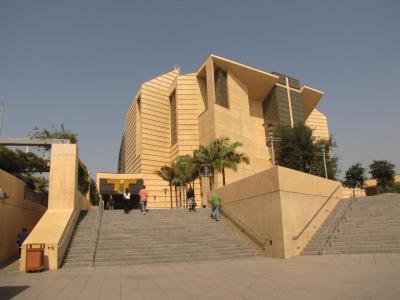


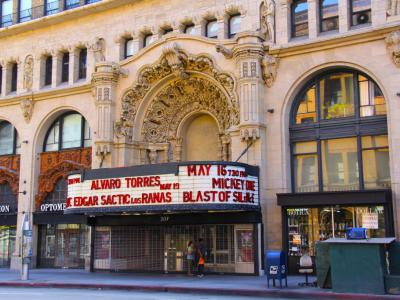
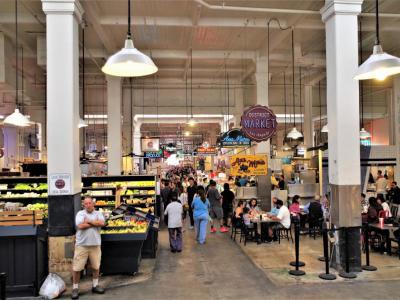
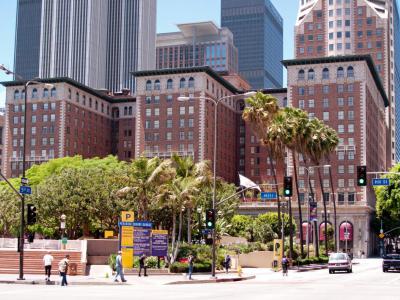







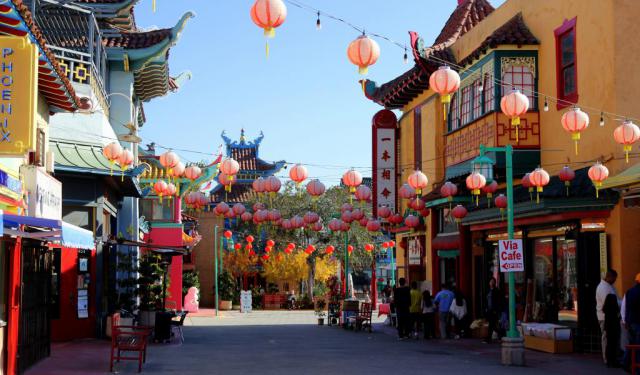


.jpg)
